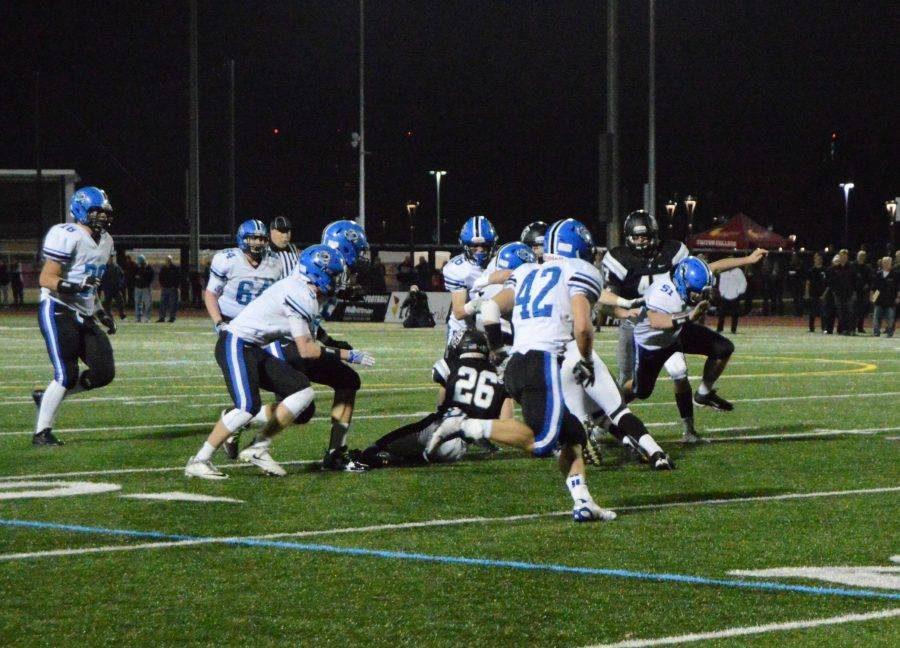Administration reinforces school expectations in weeks following hazing allegations
Photo by Danna Tabachnik
Football players run a play during the November 5 playoff game against Fenwick, a week after alleged hazing took place in the locker room. In response to that incident, administration has reiterated rules on student supervision to faculty and the student body.
In the weeks after the ‘egregious’ locker room behavior on the football team, administration has begun to reinforce student regulations to create a safer environment in the school, but the rules have left some students feeling the changes are too harsh.
“A good analogy for this is when somebody is driving in a car and how many times have we all gone over the speed limit? What does everybody do when they see a police car? They slow down. Once they pass that police car, maybe they’ll speed up, but maybe next time they’ll think about it a little bit more,” Ryan Rubenstein, assistant principal of facilities and activities, said.
The changes that students may have noticed over the past few weeks are due to a reinforcement rules that were already in place, according to Rubenstein.
“We had a concern with our football team that is being addressed. We took it upon ourselves to ensure that the rest of our coaches and sponsors [had] those expectations reiterated to them,” Rubenstein said. “[There has been] increase in awareness in what was going on and where students were and all of those different types of things, but that’s what we want. We need to take responsibility for [students] when [they are] in our building.”
The expectations that have been reiterated have affected students like Jake Baffa, junior cross country runner, who says he has noticed a change in his admittance to athletic locker rooms in the time since the football team’s October 27 hazing incident.
“We don’t get to use the locker room anymore, and the rule is, to my understanding, that you have to have a coach with you to use the locker room, which we don’t have since [winter running is] a club,” Baffa said. “So we leave our stuff out in the lobby, which is usually fine, [but on November 13], I left [my bag] in the lobby. It’s gone.”
Baffa said he and his fellow runners have had to discontinue their frequent morning runs that helped them gain more mileage as well as have more time in the afternoon for other school activities due to the alleged incident, which is inconvenient to more than just runners.
“I think it’s a locker room that everybody uses and that they have to respect that some people count on that to keep their stuff in. That’s money that the school spent on a really convenient space for a bunch of people to keep their stuff and not use it for the stuff the football team was using it for,” Baffa said. “They’re punishing the whole, which I don’t think is [fair].”
Other than athletes without a coach not being admitted to the locker rooms, teams are not allowed to meet without a coach present and students are not allowed to be in a classroom without a teacher in the room, according to Rubenstein.
“There are some things that could be beneficial, but some things that [are not]. We never really did anything in the locker room that could get us in trouble [until that day],” Kyle Roth, varsity football player, said. “I think a part of bonding for a team is being together as a team without anybody around. Even if stuff could happen. Being alone as a team is a big part of building good relationships and becoming better as a team.”
Even though Roth, Baffa, and other students find the new expectations of student monitoring unnecessary, Jean Malek, director of communications for District 95, disagrees with their position.
“I think [the reinforcement of these expectations is] just a good idea for the safety of our students. I don’t think it necessarily relates to hazing, it’s just that we expect to create a safe environment of our students,” Malek said. “These rules were in place and they will continue to be in place.”

As a senior, Meggie is the Web Editor-in-Chief of Bear Facts Student Media. Previously, she was the Social Media Manager in charge of the staff Twitter...

This is Danna's (pronounced Donna, not Dana) third year on staff and fourth year involved in the journalism program. She's on the Varsity Tennis team...

